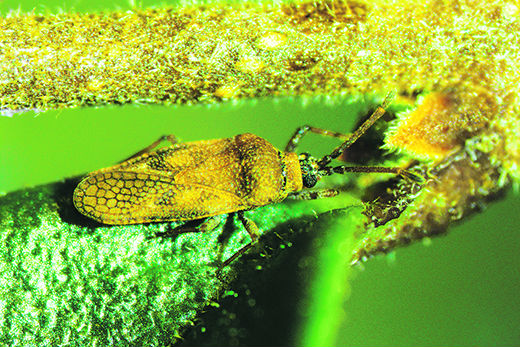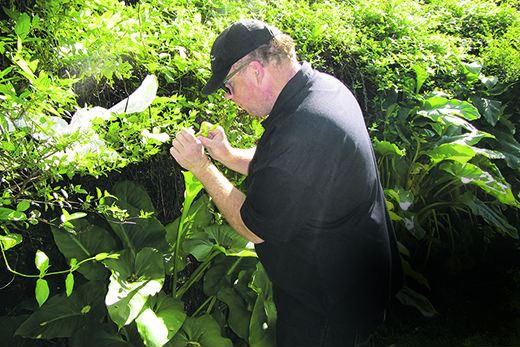Let's imagine Brad Pitt is playing a role of a senior biosecurity officer who is charged with releasing an alien into the community to devour and destroy everything in its path. It may seem a bit far-fetched… or is it?
Shane Grayling is a senior biosecurity officer for the Bay of Plenty Regional Council. It's a job he's been doing for about three-and-a-half years.
Photos: Supplied.
He takes his job seriously, Shane helps to introduce new species to the environment to aid in the eradication of plants or insects which have a detrimental effect on the environment or the community.
Currently Shane is working on the release of the privet lace bug (Leptoypha hospital) a new privet-eating insect. The bug has been released at a trial site in Bethlehem, in an effort to improve control of the unpopular pest plant.

Shane says he is excited about the release of the bug, but it will be a few years before they'll know how effective the insect will be for controlling privet.
'A lot of people blame privet for their allergic reactions, so it's great to have a potential new control option. Both the nymphs and adult privet lace bugs feed by piercing and sucking on privet leaves, causing dieback in the branch tips.”
He says weather conditions, predator insects and a range of other variables can affect how well a new biological control agent establishes, reproduces and feeds.
'It's only by trialling it in the field that we'll see what situations it can perform best in. We won't be distributing the privet lace bug more widely until we've seen how well it works and built up enough stock at the trial sites,” Shane says.
Landcare Research has developed the bug as a biological control agent for Chinese privet (Ligustrum sinense). Developers hope it will also have some spill over effect into tree privet (Ligustrum lucidum).
Regional Council has supported the development along with other councils under the National Biocontrol Collective. The bug originates from China and Malaysia. Thorough testing and assessments have been completed to make sure the bug won't threaten native wildlife or agriculture in New Zealand.
Other biological control agents are already being used in New Zealand to help control weeds like St John's wort, ragwort and buddleia.
Shane says improved privet control may not be a magic cure for all allergy sufferers. Recent studies by the Auckland Allergy Clinic have found pollen from grasses, plantain, and birch can be greater contributors to allergy problems.
'Another study that explored offensive or irritating scents found that there was little difference between privet and other scents, including jasmine, lavender and honeysuckle, and many people couldn't tell the difference.
'Privet is a weed that we encourage people to control. We can provide advice on effective control methods, but recommend that allergy sufferers seek medical advice and consider what else is growing nearby too.”
Shane says the trial had been working well in the controlled area and there are plans to release it in a controlled area in the Eastern Bay of Plenty soon.
So does Shane see his role turning into a Hollywood movie?
'No I don't think it's that exciting.”



1 comment
Biocontrol?
Posted on 02-11-2015 13:58 | By morepork
so what exactly do we do if this fails? Do we just ask nicely for all the little bugs to kindly die off? Time and again we have seen Biocontrol turn into an ecological disaster. Why is this being tested in the Bay? Don't we have any offshore islands they could use?
Leave a Comment
You must be logged in to make a comment.